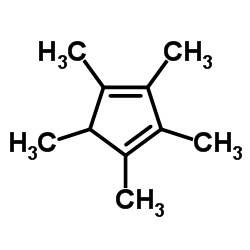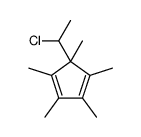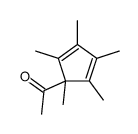7641-77-2
| 中文名 | 六甲基杜瓦苯 |
|---|---|
| 英文名 | 1,2,3,4,5,6-hexamethylbicyclo[2.2.0]hexa-2,5-diene |
| 英文别名 |
1,2,3,4,5,6-Hexamethylbicyclo(2,2,0)hexa-2,5-diene
BICYCLO(2.2.0)HEXA-2,5-DIENE,HEXAMETHYL Hexamethyl-bicyclo(2.2.0)hexa-2,5-dien [German] MFCD00001337 2-Butin hexamethyl-dewar-benzol [German] Dewar benzene,hexamethyl hexamethyl(Dewar benzene) radical Hexamethyldewarbenzene EINECS 231-576-3 hexamethylbicyclo<2.2.0>hexa-2,5-diene hexamethylbicyclo[2.2.0]diene |
| 密度 | 0.803 g/mL at 25ºC(lit.) |
|---|---|
| 沸点 | 60ºC20 mm Hg(lit.) |
| 熔点 | 7ºC(lit.) |
| 分子式 | C12H18 |
| 分子量 | 162.27100 |
| 闪点 | 95 °F |
| 精确质量 | 162.14100 |
| LogP | 3.69900 |
| 折射率 | n20/D 1.448(lit.) |
| 储存条件 | 密封储存,储存于阴凉、干燥的库房。远离热源,火花,火焰,易燃易爆区。冷藏温度4ºC。 |
| 稳定性 | 常温常压下稳定,避免与强氧化剂接触。 |
| 计算化学 | 1.疏水参数计算参考值(XlogP):2.3 2.氢键供体数量:0 3.氢键受体数量:0 4.可旋转化学键数量:0 5.互变异构体数量:无 6.拓扑分子极性表面积0 7.重原子数量:12 8.表面电荷:0 9.复杂度:268 10.同位素原子数量:0 11.确定原子立构中心数量:0 12.不确定原子立构中心数量:0 13.确定化学键立构中心数量:0 14.不确定化学键立构中心数量:0 15.共价键单元数量:1 |
| 更多 | 1. 性状:黄色透明液体 2. 密度(g/mL,25℃):0.803 3. 相对蒸汽密度(g/mL,空气=1):未确定 4. 熔点(ºC):7 5. 沸点(ºC,常压):未确定 6. 沸点(ºC,20mmHg):60 7. 折射率(n20/D):1.448 8. 闪点(ºC):35 9. 比旋光度(º):未确定 10. 自燃点或引燃温度(ºC):未确定 11. 蒸气压(mmHg,217ºC):未确定 12. 饱和蒸气压(kPa,25ºC):未确定 13. 燃烧热(KJ/mol):未确定 14. 临界温度(ºC):未确定 15. 临界压力(KPa):未确定 16. 油水(辛醇/水)分配系数的对数值:未确定 17. 爆炸上限(%,V/V):未确定 18. 爆炸下限(%,V/V):未确定 19. 溶解性:未确定 |
Synonym:1,2,3,4,5,6-Hexamethylbicyclo[2.2.0]hexa-2,5-diene; 2-Butin hexamethyl-dewar-benzol; Bicyclo(2.2.0)hexa-2,5-diene, hexamethyl-; Hexamethyl-bicyclo(2.2.0)hexa-2,5-die Section 2 - COMPOSITION, INFORMATION ON INGREDIENTS
Risk Phrases: 10 Section 3 - HAZARDS IDENTIFICATION EMERGENCY OVERVIEW
Flammable.Light sensitive. Potential Health Effects Eye: May cause eye irritation. May cause chemical conjunctivitis and corneal damage. Skin: May cause irritation and dermatitis. May cause cyanosis of the extremities. Ingestion: May cause gastrointestinal irritation with nausea, vomiting and diarrhea. Ingestion of large amounts may cause CNS depression. Inhalation: Aspiration may lead to pulmonary edema. Vapors may cause dizziness or suffocation. May cause burning sensation in the chest. Chronic: Effects may be delayed. Section 4 - FIRST AID MEASURES Eyes: Flush eyes with plenty of water for at least 15 minutes, occasionally lifting the upper and lower eyelids. Get medical aid immediately. Skin: Get medical aid. Flush skin with plenty of water for at least 15 minutes while removing contaminated clothing and shoes. Ingestion: Never give anything by mouth to an unconscious person. Get medical aid immediately. Do NOT induce vomiting. If conscious and alert, rinse mouth and drink 2-4 cupfuls of milk or water. Inhalation: Get medical aid immediately. Remove from exposure and move to fresh air immediately. If not breathing, give artificial respiration. If breathing is difficult, give oxygen. Do NOT use mouth-to-mouth resuscitation. Notes to Physician: Section 5 - FIRE FIGHTING MEASURES General Information: As in any fire, wear a self-contained breathing apparatus in pressure-demand, MSHA/NIOSH (approved or equivalent), and full protective gear. Vapors may form an explosive mixture with air. Vapors can travel to a source of ignition and flash back. During a fire, irritating and highly toxic gases may be generated by thermal decomposition or combustion. Will burn if involved in a fire. Use water spray to keep fire-exposed containers cool. Containers may explode in the heat of a fire. Flammable liquid and vapor. Vapors may be heavier than air. They can spread along the ground and collect in low or confined areas. Extinguishing Media: Use water spray to cool fire-exposed containers. Water may be ineffective. Use agent most appropriate to extinguish fire. Do NOT use straight streams of water. In case of fire, use carbon dioxide, dry chemical powder or appropriate foam. Section 6 - ACCIDENTAL RELEASE MEASURES General Information: Use proper personal protective equipment as indicated in Section 8. Spills/Leaks: Absorb spill with inert material (e.g. vermiculite, sand or earth), then place in suitable container. Avoid runoff into storm sewers and ditches which lead to waterways. Clean up spills immediately, observing precautions in the Protective Equipment section. Remove all sources of ignition. Use a spark-proof tool. A vapor suppressing foam may be used to reduce vapors. Section 7 - HANDLING and STORAGE Handling: Wash thoroughly after handling. Remove contaminated clothing and wash before reuse. Use only in a well-ventilated area. Ground and bond containers when transferring material. Use spark-proof tools and explosion proof equipment. Avoid contact with eyes, skin, and clothing. Empty containers retain product residue, (liquid and/or vapor), and can be dangerous. Keep away from heat, sparks and flame. Avoid ingestion and inhalation. Store protected from light. Do not pressurize, cut, weld, braze, solder, drill, grind, or expose empty containers to heat, sparks or open flames. Storage: Keep away from heat, sparks, and flame. Store in a cool, dry, well-ventilated area away from incompatible substances. Refrigerator/flammables. Keep containers tightly closed. Store protected from light. Section 8 - EXPOSURE CONTROLS, PERSONAL PROTECTION Engineering Controls: Facilities storing or utilizing this material should be equipped with an eyewash facility and a safety shower. Use adequate general or local explosion-proof ventilation to keep airborne levels to acceptable levels. Exposure Limits CAS# 7641-77-2: Personal Protective Equipment Eyes: Wear appropriate protective eyeglasses or chemical safety goggles as described by OSHA's eye and face protection regulations in 29 CFR 1910.133 or European Standard EN166. Skin: Wear appropriate protective gloves to prevent skin exposure. Clothing: Wear appropriate protective clothing to prevent skin exposure. Respirators: A respiratory protection program that meets OSHA's 29 CFR 1910.134 and ANSI Z88.2 requirements or European Standard EN 149 must be followed whenever workplace conditions warrant respirator use. Section 9 - PHYSICAL AND CHEMICAL PROPERTIES Physical State: Liquid Color: clear yellow Odor: none reported pH: Not available. Vapor Pressure: Not available. Viscosity: Not available. Boiling Point: 60 deg C @ 20 mmHg Freezing/Melting Point: 0.7 - 1 deg C Autoignition Temperature: Not applicable. Flash Point: 35 deg C ( 95.00 deg F) Explosion Limits, lower: Not available. Explosion Limits, upper: Not available. Decomposition Temperature: Not available. Solubility in water: Not available. Specific Gravity/Density: .8030g/cm3 Molecular Formula: C12H18 Molecular Weight: 162.27 Section 10 - STABILITY AND REACTIVITY Chemical Stability: Stable under normal temperatures and pressures. May decompose when exposed to light. Conditions to Avoid: Incompatible materials, light, ignition sources, excess heat, strong oxidants. Incompatibilities with Other Materials: Oxidizing agents, direct light. Hazardous Decomposition Products: Carbon monoxide, irritating and toxic fumes and gases, carbon dioxide. Hazardous Polymerization: Has not been reported Section 11 - TOXICOLOGICAL INFORMATION RTECS#: CAS# 7641-77-2: DT7320000 LD50/LC50: Not available. Carcinogenicity: Hexamethyl dewar benzene - Not listed by ACGIH, IARC, or NTP. Other: See actual entry in RTECS for complete information. Section 12 - ECOLOGICAL INFORMATION Section 13 - DISPOSAL CONSIDERATIONS Dispose of in a manner consistent with federal, state, and local regulations. Section 14 - TRANSPORT INFORMATION IATA Shipping Name: FLAMMABLE LIQUID, N.O.S.* Hazard Class: 3 UN Number: 1993 Packing Group: II IMO Shipping Name: FLAMMABLE LIQUID, N.O.S. Hazard Class: 3.2 UN Number: 1993 Packing Group: II RID/ADR Shipping Name: FLAMMABLE LIQUID, N.O.S. Hazard Class: 3 UN Number: 1993 Packing group: II Section 15 - REGULATORY INFORMATION European/International Regulations European Labeling in Accordance with EC Directives Hazard Symbols: Not available. Risk Phrases: R 10 Flammable. Safety Phrases: S 16 Keep away from sources of ignition - No smoking. WGK (Water Danger/Protection) CAS# 7641-77-2: No information available. Canada None of the chemicals in this product are listed on the DSL/NDSL list. CAS# 7641-77-2 is not listed on Canada's Ingredient Disclosure List. US FEDERAL TSCA CAS# 7641-77-2 is not listed on the TSCA inventory. It is for research and development use only. SECTION 16 - ADDITIONAL INFORMATION N/A |
|
毒理学数据: 1、慢性毒性/致癌性 小鼠经皮下TDLo:800mg/kg/15W-I; CHEMICAL IDENTIFICATION
HEALTH HAZARD DATAACUTE TOXICITY DATA
|
| 风险声明 (欧洲) | 10 |
|---|---|
| 安全声明 (欧洲) | S16;S33;S36/S37/S39 |
| 危险品运输编码 | UN 3295 3/PG 3 |
| 包装等级 | III |
| 危险类别 | 3.2 |
| 上游产品 0 | |
|---|---|
| 下游产品 5 | |



![1,3,4,5,6-pentamethyl-2-methylidenebicyclo[3.1.0]hex-3-ene结构式](https://image.chemsrc.com/caspic/320/20055-93-0.png)


